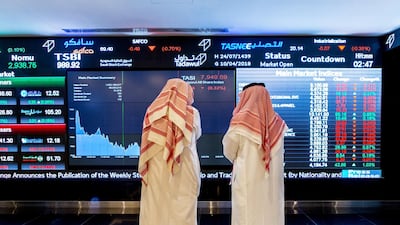Saudi Industrial Investment Group (SIIG) and National Petrochemical Company (Petrochem) started merger talks, which may create a new entity with 35.6 billion riyals in assets .
The SIIG board gave the nod to begin discussions about a potential transaction at its meeting on September 17, the company said in a statement to the Tadawul stock exchange, where its shares trade. SIIG already controls a 50 per cent stake in Petrochem.
Talks to “study the economic feasibility of merging the two companies” are at an early stage, SIIG said.
As of June 30, SIIG had about 19.2bn riyals of assets and Petrochem had 16.4bn riyals.
Petrochem confirmed initiations of talks in a separate bourse filing. Any deal agreed would be subject to the approval of shareholders from both companies and regulators.
The tie-up "makes a lot of sense with what is going on with the pandemic and demand decline ... regionally and globally," Nabil Rantisi, general manager for wealth management at Dubai-based Daman Investments, said.
"It is very much needed not only to increase efficiency," he said. "For some companies [in the industry it's a] survival issue. We all know the demand hasn't come back to what it was pre-pandemic."
An agreement has yet to be reached on the final structure of the potential deal, SIIG said.
"We think this merger, it's more of a swap," Mazen Al Sudairi, head of research at Al Rajhi Capital in Riyadh, said of the possible structure of the transaction.
"SIIG already owns [half of] Petrochem but they don’t have full control. They want to be 100 per cent shareholders," he added.
Shares of Petrochem climbed on Sunday climbed 6.78 per cent and SIIG ended trade with 5.48 per cent gain.
Petrochemical producers in the Middle East are increasingly looking to consolidate in a bid to gain scale as they face difficult market conditions. Profits are also under pressure amid a slump in prices and demand for their products.
Last year, Saudi International Petrochemical Company (Sipchem) completed its buyout of the Saudi Sahara Petrochemical in a multi-billion dollar deal. Saudi Aramco, the world’s biggest oil producing company, also took a majority stake in the Middle East’s biggest petrochemicals producer, Saudi Basic Industries Corporation in 2019. The $69.1bn (Dh253bn) deal was completed in June this year.
The Covid-19 pandemic, which disrupted global supply chains and tipped the world economy into a recession, has increased pressure on petrochemical producers. Overall demand for petrochemicals shrank 7 per cent between December 2019 and April 2020, according to the industry tracker ICIS. Over a full year period, demand will contract as much as 10 per cent on average, as a result of the pandemic, according to Boston Consulting Group.
A rise in demand for medical and personal care products has helped parts of the petrochemical industry, however, producers associated with sectors hit harder by the pandemic, such as construction and automotive industries, are struggling, S&P Global Platts said in its latest petrochemicals sector outlook report.
As the industry moves into the second half of 2020, renewed movement restrictions and a prolonged economic recession paint a "far from clear-cut" picture, according to S&P Global Platts.
SIIG, which has been trading on Tadawul since 2004, has 4.5bn riyals of paid-up capital. It also owns a 50 per cent stake in both Saudi Chevron Phillips Company and Jubail Chevron Phillips Company.
Petrochem, which is based in Riyadh, has paid-up capital of 4.8bn riyals. The company owns a 65 per cent stake in Saudi Polymers, which produces petrochemical products.

